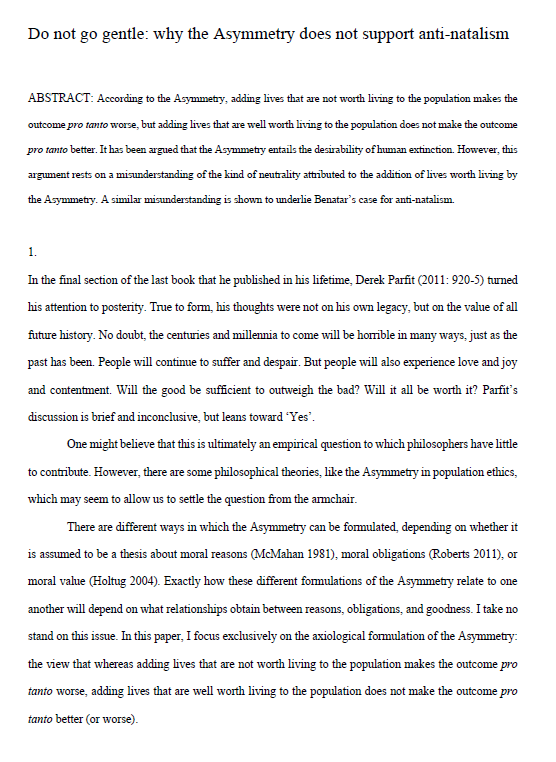Do not go gentle: why the Asymmetry does not support anti-natalism
Andreas Mogensen (Global Priorities Institute, Oxford University)
GPI Working Paper No. 3-2021
According to the Asymmetry, adding lives that are not worth living to the population makes the outcome pro tanto worse, but adding lives that are well worth living to the population does not make the outcome pro tanto better. It has been argued that the Asymmetry entails the desirability of human extinction. However, this argument rests on a misunderstanding of the kind of neutrality attributed to the addition of lives worth living by the Asymmetry. A similar misunderstanding is shown to underlie Benatar’s case for anti-natalism.
Other working papers
Numbers Tell, Words Sell – Michael Thaler (University College London), Mattie Toma (University of Warwick) and Victor Yaneng Wang (Massachusetts Institute of Technology)
When communicating numeric estimates with policymakers, journalists, or the general public, experts must choose between using numbers or natural language. We run two experiments to study whether experts strategically use language to communicate numeric estimates in order to persuade receivers. In Study 1, senders communicate probabilities of abstract events to receivers on Prolific, and in Study 2 academic researchers communicate the effect sizes in research papers to government policymakers. When…
It Only Takes One: The Psychology of Unilateral Decisions – Joshua Lewis (New York University) et al.
Sometimes, one decision can guarantee that a risky event will happen. For instance, it only took one team of researchers to synthesize and publish the horsepox genome, thus imposing its publication even though other researchers might have refrained for biosecurity reasons. We examine cases where everybody who can impose a given event has the same goal but different information about whether the event furthers that goal. …
Three mistakes in the moral mathematics of existential risk – David Thorstad (Global Priorities Institute, University of Oxford)
Longtermists have recently argued that it is overwhelmingly important to do what we can to mitigate existential risks to humanity. I consider three mistakes that are often made in calculating the value of existential risk mitigation: focusing on cumulative risk rather than period risk; ignoring background risk; and neglecting population dynamics. I show how correcting these mistakes pushes the value of existential risk mitigation substantially below leading estimates, potentially low enough to…

